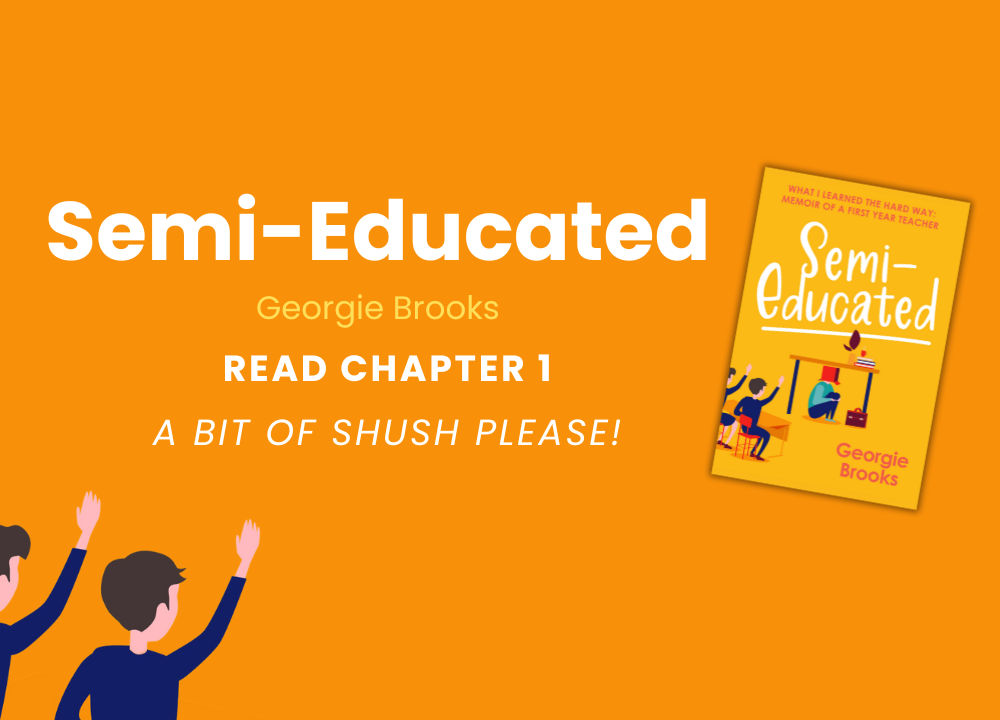Enjoy Chapter 1: A bit of shush please! from Semi-Educated by Georgie Brooks.
A noisy out-of-control classroom, packed with twenty-six teenagers simultaneously talking, laughing and shouting exudes a physical energy that can and does rattle windows. Their vitality could probably power all the electronic devices they have secreted on their person, in defiance of the school rules. As if I am in a dystopian novel, I can feel my life force being drained by the children surrounding me, who grow even more energised and powerful as I become weaker and unable to communicate at all.
‘Quiet,’ I say again, my voice rasping from trying to talk over their noise. Only the class good girl, in the first row in front of the teacher’s desk, looks at me, but that seems to be out of pity rather than respect. Even she, I notice now, is openly drawing an artistic masterpiece (with a black Texta that I pray isn’t a permanent marker) on her desk. Right where it will be visible to the Head of Middle School, who will be teaching a lesson in this classroom later in the day.
‘A bit of shush, please,’ I almost plead, terrified that the experienced teacher working in the next classroom will have to come and take control of my class. ‘Stop that,’ I snap to the boys who are rabbit punching the neck of a student in the row in front of them. Three girls cackle, with the maniacal laughter of the witches in Macbeth, and their victim bursts into tears and runs crying from the classroom. I know I should intervene, provide some pastoral care, but I’m unable to leave the rioting mob that are, in name only, under my control. Like all unruly hordes, they are terrifying. They exude the ominous scent of predators, an aroma of unchecked power, defiance and hormones.
‘You will need to read chapter three and do the questions I handed out earlier for homework,’ I say, and bravely turn to write this on the smeary whiteboard, scarily breaking eye contact and offering the class the opportunity to do something even worse than what they were doing while I was watching them. My announcement, along with nearly everything else I have said in this lesson, is ignored. My blood pressure is so high I am worried I will collapse with a heart attack in front of the class and I wonder, in the panicked reptilian part of my brain, almost the only section of my mind still functioning, whether the class will call for help or tear my body into pieces as a final manifestation of their power. There are still five minutes of the lesson to go, but most of the students have started slamming their books shut, zipping up pencil cases and standing up ready to go out and start their lunch break.
‘The bell hasn’t gone yet,’ I bleat, in one final, futile attempt to impose my will on the class. I am sweating with nerves and shame, and stink of failure and desperation. No-one pays me any attention. The students start leaving, obeying some invisible primal urge, as if they are salmon heading upstream to spawn. At least no-one has spawned in my classroom. Or at least I hope not – I couldn’t really see the back row of the class for the last half of the lesson.
Students walking briskly out of my classroom display more motivation, energy and purpose than they have shown in the preceding forty-five minutes. My classroom is deserted in seconds, with just discarded sweet wrappers and the photocopied homework questions lying crumpled on the desks, looking even more depressing under the white flickering fluorescent lights.
The posters on the classroom walls all sag and flap, like disappointed faces, revealing that some students have used my lesson to steal the drawing pins from the display boards again. No doubt the squeals I can hear echoing from the hallways are my students pricking each other with those pins. A large, laminated poster breaks completely free from the wall and slowly drifts towards me. I try to grasp it, but of course fail at this, as I have done with everything else this lesson. The poster is as slippery as a fish and I have to awkwardly jiggle and scrape at it to pick it up from the floor. It is a pastel peach colour, as synthetic as its inspirational statement, which proclaims in a nauseating font, ‘If You Try, You Can Do Anything’. I can’t even be bothered to try, or even remember why I wanted to try. I trudge off down the scuff-marked hallway after my students, to start my assigned yard duty, wandering all over the playground to stop any further bad behaviour, wondering hopefully whether I will pass a staff toilet on my way so I can do my first wee of the work day.
I don’t know why I’m not sitting in a quiet office, about to go down for a coffee break with other civilised adults in a lovely inner-city café with a proper whistling coffee machine, gourmet food and no loud bells. I don’t know why I ever thought I should do teaching and I really don’t know if I’ll ever actually be able to teach anyone anything. I’d wanted to help kids discover a love of learning and develop a life-changing passion for words and literature, but I’ve only enabled noise, chaos, mob rule and some children to get stabbed with drawing pins. The lunch bell finally rings, in a deafening discordant noise, from a speaker just above my head (at six foot tall I am not only closer to God, but closer to the noise). I jerk instinctively away from the painful sound and try to cover my ears, to the amusement of another group of teenagers (still seated in their class with their proper, in-control teacher), who are happily watching my antics through their classroom window. I try to pull myself up to my full height and assert some dignity. At least I haven’t wet my pants, no mean achievement after having two four-kilo babies. Righto. Only yard duty and three lessons to go. Then it will be 3.30 and I can look forward to about six hours of marking and a panicked two hours of lesson prep for tomorrow. I don’t think I will have any time spare to spend with my own children tonight.
The perfect work–life balance that I was deluded enough to think that teaching could offer is completely swung towards work and survival. Sleep and time with my family have been cast aside as I desperately try to keep pace with the demands of being a new teacher. Maslow’s Hierarchy of Needs – something which we spent a lot of time on during my university-based training to be a teacher – sets out, in a neat pyramid, the needs that need to be met for all people before self-actualisation (and learning) can occur. At the bottom of the pyramid are the basic physiological needs for sleep and food. Although our focus was on the needs of the student, not of the teacher, I reflect dismally that I am not meeting even these. Hopefully tomorrow I can exert some control in the classroom and actually teach something, then go home, spend quality time with my family, catch up on my marking and lesson planning, and get to bed before midnight.
Everything is going just as I had hoped when I decided to become a teacher.

Semi-Educated by Georgie Brooks is available now in print and eBook.



